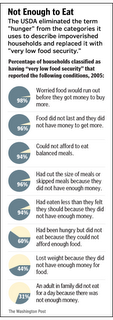
Tuesday, November 21, 2006
Doublespeak Alert: Bush Administration Redefines "Hunger" as "Low Food Security"

From Wikipedia: Doublespeak is language deliberately constructed to disguise or distort its actual meaning, often resulting in a communication bypass. Such language is often associated with governmental, military, and corporate institutions and its deliberate use by these is what distinguishes it from other euphemisms. Doublespeak may be in the form of bald euphemisms ("downsizing" for "firing of many employees") or deliberately ambiguous phrases ("wet work" for "assassination", "take out" for "destroy").
The word doublespeak was coined in the early 1950s. It is often incorrectly attributed to George Orwell and his 1945 dystopian novel Nineteen Eighty-Four. The word actually never appears in that novel; Orwell did, however, coin newspeak, oldspeak, and doublethink, and his novel made fashionable composite nouns with speak as the second element, which were previously unknown in English. It was therefore just a matter of time before someone came up with doublespeak.
Doublespeak may be considered, in Orwell's lexicography, as the B vocabulary of Newspeak, words "deliberately constructed for political purposes: words, that is to say, which not only had in every case a political implication, but were intended to impose a desirable mental attitude upon the person using them."
Doublespeak is most reminiscent of Orwell's "newspeak" when it is used by a government agency to cover up something unpleasant. The government may find the need to talk about something that has negative connotations to large portions of the public, and avoids backlash by replacing the term with a new one that most people will not recognize as the same thing.
Doublespeak was very common in the Third Reich. Goebbels' Reichsministerium für Volksaufklärung und Propaganda (Ministry of the Reich for Public Enlightenment and Propaganda) coined thousands of new German words. Other examples include "concentration camp" (labor/death camp, or "joycamp" in Newspeak), "protective custody" (imprisonment without due process of law), "Heim ins Reich" (occupation of Austria), and particular new meanings for "Volk" (people) and "Rasse" (race). The "Final Solution", i.e. Extermination of all Jews is probably the most well-known of such words.
A prominent example of doublespeak in the corporate world is the number of different phrases that all describe the action of "firing lots of employees", usually obliquely. These phrases include "layoffs," "downsizing," "right-sizing," "headcount adjustment," "RIF" (reduction in force), and "realignment." The Dilbert comic strip satirizes this in one strip in which an employee understands none of these terms and is unable to figure out that he has been fired. Corporate doublespeak can also involve downplaying problems, such as calling a fix for a software bug a "reliability enhancement."
Doublespeak Alert: The Bush Administration has ended the crisis of hunger by redefining it as “low food security.” According to the Washington Post, in a November 16, 2006 article:
The USDA said that 12 percent of Americans -- 35 million people -- could not put
food on the table at least part of last year. Eleven million of them reported
going hungry at times. Beginning this year, the USDA has determined "very low
food security" to be a more scientifically palatable description for that group.
Comments:
<< Home
What a nice way to say that the millions of Americans going hungry really aren't. This relates to an article I just read called Perception of Freedom in America that details ways we live with many perceptions that don't fit our actual reality. If people are starving and we call it something else, then does that mean people aren't starving anymore?!
Post a Comment
<< Home

 Stumble It!
Stumble It!